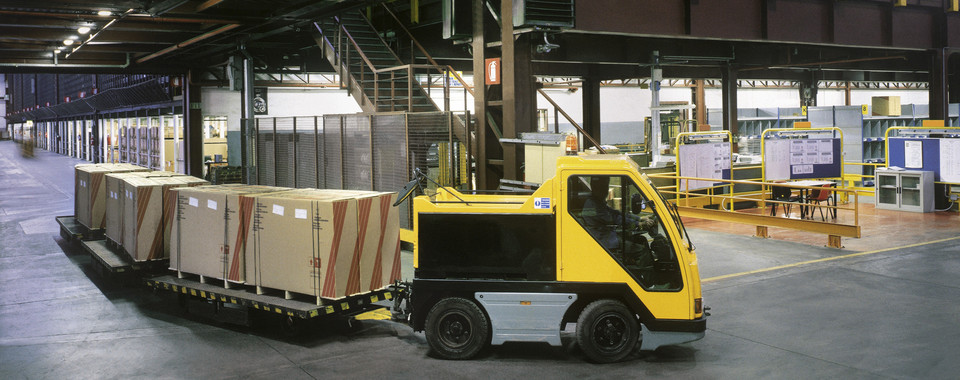
Apr 14, 2025 // Zdravka Ley
More than just in a circle: How tugger trains are changing internal logistics thanks to intelligent management
Why intelligent tugger train optimization is crucial.
Feb 17, 2025 Laura Skropke
ShareThe automotive sector is undergoing a major transformation: Stricter emissions regulations, fluctuating market demands, and rising cost pressures are forcing logistics specialists and supply chain managers to develop new strategies. Increasingly, even seemingly “minor” processes are being scrutinized for optimization opportunities. One often underestimated area is container and reusable packaging management. By ensuring end-to-end visibility and AI-assisted control, companies can significantly reduce both costs and CO₂ emissions.
Global supply chains in the automotive industry must simultaneously meet high standards for environmental sustainability and economic viability. At the same time, supply chain managers face issues such as shortages of critical components, unpredictable shifts in demand, new import tariffs, and tightening regulations. In this context, supposedly “downstream” processes like load carrier management can fall by the wayside. Yet container shortages, surpluses, or prolonged searches for available containers can generate substantial costs and degrade the CO₂ balance. Moreover, if indispensable load carriers are missing, production delays become inevitable.
A structured container and reusable packaging management system makes logistics processes both more efficient and more sustainable. Four key areas are particularly important:
Traditional container and reusable packaging management often relies on manual or partially automated data collection. The result: data gaps, delays, and limited transparency. In times of geopolitical risks, volatile sales markets, and a heightened focus on resource conservation, these blind spots can lead to costly missteps.
AI-assisted software solutions like SYNCROTESS, on the other hand, enable:
Thanks to modern cloud systems, companies can now consolidate and analyze container and material data from different facilities and regions in real time. For logistics professionals in the automotive sector, that means all relevant information about container inventory and requirements is accessible from anywhere—whether it’s a plant in Germany, an assembly line in Spain, or a supplier in the Czech Republic. This visibility helps identify shortages quickly and find alternative routes or suppliers, making it a key factor in building resilient supply chains.
A professionally managed container system pays off in multiple ways. Beyond the clear cost savings, comprehensive transparency in the material flow markedly improves a company’s CO₂ footprint and supports quality management for transport packaging. Unnecessary empty runs are eliminated, containers remain more productive, and they are available for additional cycles. Contamination and damage can be traced back to the source, and recurring issues with load carriers can be identified early on.
Sustainable practices also enhance the company’s reputation. Customers, partners, and investors increasingly appreciate investments in green technologies and responsible processes. By embracing these initiatives, a business not only strengthens its market position but also demonstrates foresight on environmental stewardship and social responsibility.
In an era of stricter environmental regulations, volatile supplier markets, and intense cost pressures, AI-based container management has become an indispensable cornerstone for successful automotive logistics and supply chain strategies. The advantages speak for themselves: lower resource consumption, reduced CO₂ emissions, and audit-proof documentation of all container movements.
Early adopters of these solutions streamline their workflows and enjoy the benefits of a future-focused, sustainable reputation. Simply put, forward-looking processes in the automotive industry are more than a passing trend—they’re a critical factor for long-term success, both operationally and strategically for supply chain managers.
About our Expert

Laura Skropke
Product Expert | Container and Reusable Packaging Management
Laura Skropke has been working as a Product Marketing Specialist at INFORM since September 2024. Her focus is on optimizing container and reusable packaging management and promoting sustainable, efficient circular economy solutions in logistics.